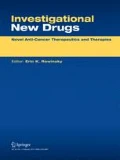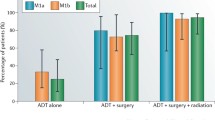Abstract
The discovery of multiple putative therapeutic targets and multipleputative agents for these targets in prostate cancer in the coming yearsposes significant challenges for clinical trial design. This is especiallytrue for cytostatic agents that are not expected to lead to frank tumorshrinkage or declines in the PSA. The most promising agents will need tobe identified early in their development. Since surrogate biologic markersare likely to play a critical role, the identification and validation ofthese markers is discussed. A number of non-traditional phase I and phaseII clinical trial designs, including pre-operative dosing for assessingdrug effect on a marker and the randomized discontinuation phase IIdesign, are also discussed in detail. Use of such designs as well assurrogate marker validation will likely be required to efficiently chooseappropriate agents for definitive study in the phase III setting.
Similar content being viewed by others
References
Bubley GJ, Carducci M, Dahut W, Dawson N, Daliani D, Eisenberger M, Figg WD, Freidlin B, Halabi S, Hudes G, Hussain M, Kaplan R, Myers C, Oh W, Petrylak DP, Reed E, Roth B, Sartor O, Scher H, Simons J, Sinibaldi V, Small EJ, Smith MR, Trump DL, Wilding G: Eligibility and response guidelines for phase II clinical trials in androgenindependent prostate cancer: recommendations from the Prostate-Specific Antigen Working Group. J Clin Oncol 17: 3461–3467, 1999
Therasse P, Arbuck SG, Eisenhauer EA, Wanders J, Kaplan RS, Rubinstein L, Verweij J, Van Glabbeke M, van Oosterom AT, Christian MC, Gwyther SG: New guidelines to evaluate the response to treatment in solid tumors. European Organization for Research and Treatment of Cancer, National Cancer Institute of the United States, National Cancer Institute of Canada [see comments], J Natl Cancer Inst 92: 205–216, 2000
Chen TT, Chute JP, Feigal E, Johnson BE, Simon RA: Model to select chemotherapy regimens for phase III trials for extensive-stage small-cell lung cancer. J Natl Cancer Inst 92: 1601–1607, 2000
Kelly WK, Scher HI, Mazumdar M, Vlamis V, Schwartz M, Fossa SD: Prostate-specific antigen as a measure of disease outcome in metastatic hormone-refractory prostate cancer [see comments]. J Clin Oncol 11: 607–615, 1993
Simon R: Optimal two-stage designs for phase II clinical trials. Control Clin Trials 10: 1–10, 1989
Prentice RL: Surrogate endpoints in clinical trials: definition and operational criteria. Stat Med 8: 431–440, 1989
Fleming TR, Prentice RL, Pepe MS, Glidden D: Surrogate and auxiliary endpoints in clinical trials, with potential applications in cancer and AIDS research. Stat Med 13: 955–968, 1994
Vollmer RT, Kantoff PW, Dawson NA, Vogelzang NJ: A prognostic score for honnone-refractory prostate cancer: analysis of two cancer and leukemia group B studies. Clin Cancer Res 5: 831–837, 1999
Hsieh TY, Ng CY, Mallouh C, Tazaki H, Wu JM: Regulation of growth, PSA/PAP and androgen receptor expression by 1 alpha,25-dihydroxyvitamin D3 in the androgen-dependent LNCaP cells. Biochem Biophys Res Commun 223: 141–146, 1996
Skowronski RJ, Peehl DM, Feldman, D: Actions of vitamin D3, analogs on human prostate cancer cell lines: comparison with 1,25-dihydroxyvitamin D3. Endocrinology 136: 20–26, 1995
Zhao XY, Ly LH, Peehl DM, Feldman, D: 1alpha,25-dihydroxyvitamin D3 actions in LNCaP human prostate cancer cells are androgen-dependent. Endocrinology 138: 3290–3298, 1997
Gross C, Stamey T, Hancock S, Feldman D: Treatment of early recurrent prostate cancer with 1,25-dihydroxyvitamin D3 (calcitriol) [published erratum appears in J Urol 1998 Sep; 160(3 Pt 1):840]. J Urol 159: 2035–2039; discussion 2039-2040, 1998
Stadler WM, Ratain MJ: Development of target-based anti-neoplastic agents. Invest New Drugs 18: 7–16, 2000
Varenhorst E, Alund G, Lindstrom E, Manson JC: Bone marrow aspiration biopsy and bone scanning in the staging of prostatic cancer. Br J Urol 55: 534–537, 1983
Taplin ME, Rajeskuma B, Woda BA, Halabi S, Prins GS, Picus J, Hayes DF, Vogelzang NJ, Small EJ: Androgen receptor analyses in androgen independent prostate cancer: Cancer and Leukemia Group B 9663. Proc Amer Soc Clin Oncol 19: 1297, 2000
Wang ZP, Eisenberger MA, Carducci MA, Partin AW, Scher HI, Ts'o PO: Identification and characterization of circulating prostate carcinoma cells. Cancer 88: 2787–2795, 2000
Pollack VA, Savage DM, Baker DA, Tsaparikos KE, Sloan DE, Moyer JD, Barbacci EG, Pustilnik LR, Smolarek TA, Davis JA, Vaidya MP, Arnold LD, Doty JL, Iwata KK, Morin MJ: Inhibition of epidermal growth factor receptor-associated tyrosine phosphorylation in human carcinomas with CP-358,774: dynamics of receptor inhibition in situ and antitumor effects in athymic mice. J Pharmacol Exp Ther 291: 739–748, 1999
Koch MO, Foster RS, Bell B, Beek S, Cheng L, Parekh D, Jung SH: Characterization and predictors of prostate specific antigen progression rates after radical retropubic prostatectomy. J Urol 164: 749–753, 2000
Mick R, Crowley JJ, Carroll RJ: Phase II clinical trial design for noncytotoxic anticancer agents for which time to disease progression is the primary endpoint. Control Clin Trials 21: 343–359, 2000
Grossfeld GD, Small EJ, Carroll PR: Intermittent androgen deprivation for clinically localized prostate cancer: initial experience. Urology 51: 137–144, 1998
Sokoloff MH, Chung LW: Targeting anglogenic pathways involving tumor-stromal interaction to treat advanced human prostate cancer. Cancer Metastasis Rev 17: 307–315, 1998
Schellhammer P, Sharifi R, Block N, Soloway M, Venner P, Patterson AL, Sarosdy M, Vogelzang N, Jones J, Kolvenbag G: A controlled trial of bicalutamide versus flutamide, each in combination with luteinizing hormone-releasing hormone analogue therapy, in patients with advanced prostate cancer Casodex Combination Study Group [see comments]. Urology 45: 745–752, 1995
Kopec JA, Abrahamowicz M, Esdaile JM: Randomized discontinuation trials: utility and efficiency. J Clin Epidemiol 46: 959–971, 1993
Author information
Authors and Affiliations
Rights and permissions
About this article
Cite this article
Stadler, W. New Trial Designs to Assess Antitumor and Antiproliferative Agents in Prostate Cancer. Invest New Drugs 20, 201–208 (2002). https://doi.org/10.1023/A:1015618108456
Issue Date:
DOI: https://doi.org/10.1023/A:1015618108456



